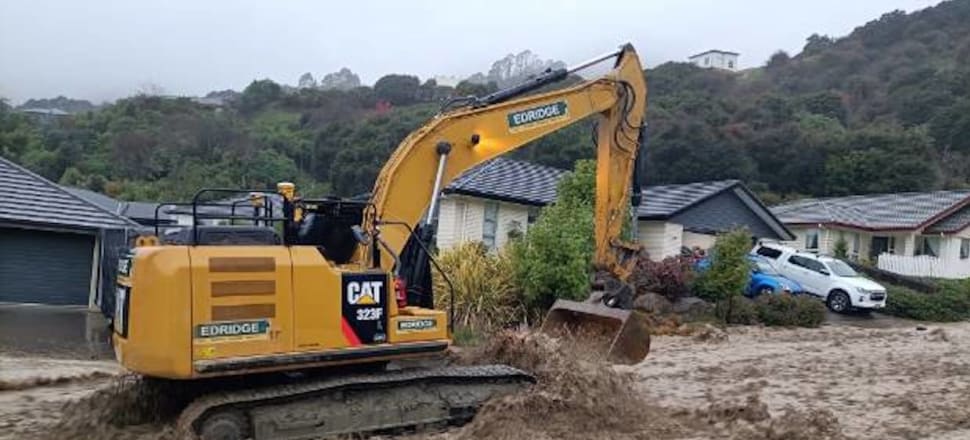
Mayors welcome Three Waters concession so most council-controlled contractors will remain council-controlled
When Nick Smith was elected mayor of Nelson last year, he promised to take the Government to task on its Three Waters reform plans.
Smith is a former MP and environment minister but before that he was a civil engineer. He had clear views on the strengths and weaknesses of the Government's reform plan.
To his mind, those views were vindicated by the floods that hit the city this month. There was a street called Devenish Place that was flooded and "completely destroyed" for the second time in six months. "Because we were the council and controlled all of our contractors, Nelmac, we just ripped in there the next week and temporarily replaced the whole lot. Which enabled people to get on with their lives."
Nelmac has 300 employees, 50 of whom work on water services. But when the floods hit, it was all hands to the pump. "That was just a temporary fix. We're now going back to put in a permanent, more resilient fix.
"I had feared that if we were to be dealing with a separate Wellington-based water agency, and arguing which pipes were theirs, which kerbs and channels were theirs, and where do the drains stop and the pipes begin between the water entities and the council, it would have been a bugger's muddle."
His first concern was allayed when Local Government Minister Kieran McAnulty announced that the proposal for four vast supra-regional water entities would be replaced with 10 regional entities. Instead of Nelson's drinking water, wastewater and stormwater being managed out of Wellington, it would be managed in the upper South Island.
READ MORE: * Budget: Time to pay the piper for Three Waters IT system * Why NZ (really) needs water reform – in five charts
His second concern – on which he lobbied hard and loud – was with the plan to tear apart council-controlled organisations that managed civil works, roads, water and other council services. He warned it would be costly to shift some staff and some assets to the new water services incorporations when, until now, they had worked across different services.
Now, he's got his wish. McAnulty has written to councils to advise that only CCOs whose predominant purpose is for water services will be transferred to the new water services entities.
There are 18 or 19 councils that provide a range of services through these arms-length council-controlled companies. The others use in-house council workers or, in the case of Auckland and Wellington, they use council-controlled organisations dedicated purely to water services. So Auckland's Watercare and Wellington Water will transfer over to the new water services incorporations, but nearly 20 organisations will remain intact under council control.
"Since becoming the Minister of Local Government, I have made it a priority to listen to the local government sector, and balance that out with the clear need for reform," McAnulty says.
"Our decision to exempt mixed-use CCOs from the transition provides a common-sense approach. We want to avoid the unbundling of staff and equipment and their transfer to different water services entities across New Zealand when we don’t have to.
"We also don’t want them being detached from existing structures and systems. This would result in unacceptable risks to service continuity across the country. Cabinet has therefore made a decision to treat mixed use CCOs differently, and any service contracts it has with councils will transfer to water services entities rather than its staff and assets."
That will entail a change to the Water Services Bill that is presently being considered by a Parliamentary select committee.
"I want to acknowledge the positive engagement we’ve already had so far with unions, councils and affected staff, and thank them for their constructive input which has helped progress these reforms," McAnulty says. "They need to happen in order to save ratepayers from unaffordable costs, but we also want to do it in a way that is straight forward with as little disruption as possible."
Further south in Buller, Mayor Jamie Cleine is delighted with McAnulty's announcement. His West Coast district, and in particular the low-lying town of Westport, are among the most flood-prone in the country. He says they need their WestReef council-controlled contractors to be able to respond to the most pressing needs, not to be carved up into siloes.
And as an added benefit, WestReef will contract its water services to the new Canterbury-West Coast water incorporation – providing Buller ratepayers with a new commercial revenue stream.
Nick Smith isn't done yet. Wearing his mayoral hat, he wants to persuade the Government to allow councils to retain collective control of the new water incorporations.
And wearing his civil engineer hat, he's adamant stormwaters should be removed from the reforms – that Three Waters should become Two Waters.
He points to the floods at Devenish Place last year, and more floods that hit Nelson at the weekend of the King's Coronation. Stormwaters aren't just pipes, he says, they're also road gutters and sports fields and wetlands.
To manage them cohesively in the face of increased climate-driven severe weather events, he says stormwaters must also remain intact under councils' control.







